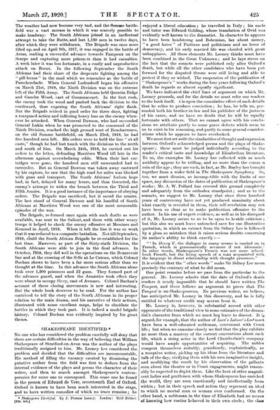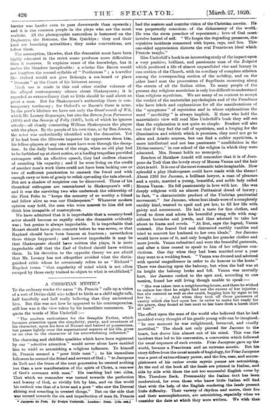SHAKESPEARE IDENTIFIED * No one who has considered the problem
carefully will deny that there are certain difficulties in the way of believing that William Shakespeare of Stratford-on-Avon was the author of the plays traditionally assigned to him. Mr. Looney hes considered the problem and decided that the difficulties are insurmountable. His method of filling the vacancy created by dismissing the putative author from the field was first to deduce from the internal evidence of the plays and poems the character of their writer, and then to search amongst Shakespeare's contem- poraries for some one to correspond. This some one he found in the person of Edward de Vero, seventeenth Earl of Oxford. Oxford is known to have been much interested in the stage, and to -have written comedies of which no trace remains ; he
• Ahakespeare Identifietl. By 7. Thomas Looney. London: 'tea Pithier." Vas. net.1 enjoyed a liberal education ; he travelled in Italy ; his uncle and tutor was Edward Golding, whose translation of Ovid was evidently well known to the dramatist. In character he appears to have been headstrong and Bohemian, lax about money, "a good hater" of Puritans and politicians and no lover of democracy, and his early married life was clouded with great
unhappiness. All these elements Mr. Looney thinks must have been combined in the Great Unknown ; and he lays stress on the fact that the sonnets were published only after Oxford's death, but while all the other candidates who have been rut forward for the disputed throne were still living and able to protest if they so wished. The suspension .of the publication of " Shakespeare's " works during the four years following Oxford's death he regards as almost equally significant.
We have indicated the chief lines of argument on which Mr. • Looney proceeds, and for the details we must refer our readers to the book itself. t is upon the cumulative effect of such details that he relies to produce conviction ; ho has, he tells us, per- suaded both his brother-in-law and his publisher of the justness of his cause, and we have no doubt that he will be equally fortunate with others. That we cannot agree with his conclu- sions we attribute partly to some grave defects which seem to us to exist in his reasoning, and partly to some general consider- ations which he appears to have overlooked.
We must first set aside the similarities of thought and expression between Oxford's acknowledged poems and the plays of Shake- speare; these must be judged individually according to the reader's critical taste and knowledge of Elizabethan literature.
To us, the examples Mr. Looney has collected with so much assiduity appear to be trifling, and no more than the comm n
coin of the age ; they are such, in fact, as Mr. Bayley has brought together from a wider field in The Shakespeare Symphony. So,
too, we must dismiss, as incompatible with the limits of our space, any discussion of the dates of publication of Shakespeare's works : Mr. A. W. Pollard has covered this ground completely and adequately from the orthodox standpoint ; and as to tho sonnets, we suggest to Mr. Looney that since three hundred years of controversy have not yet produced unanimity about what exactly is revealed in thorn, their self-revelation may not have been so clear as to make publication offensive to the author. In his use of expert evidence, as well as in his disregard of it, Mr. Looney seems to us to be open to hcstile criticism ; • but this also we must leave untouched save for one illustrative quotation, in which an extract from Sir Sidney Lee is followed by a gloss so mistaken that it raises serious doubts concerning its author's ability to think exactly :—
" In Henry V. the dialogue in many scenes is carried on in French, which is grammatically accurate if not idiomatic.' In other words, Shakespeare's French was not mere school- book French, but the living speech of a man acquainted with the language in direct relationship with thought processes."
It is evident that the "other words" make Sir Sidney Lee mean precisely the contrary of what he did mean.
One point remains before we pass from the particular to the general. Mr. Looney admits that the date of Oxford's death renders it nearly impossible that he should have written The Tempest, and there follows an argument to prove that The Tempest is un-Shakespearean. No previous writer, we believe, has anticipated Mr. Looney in this discovery, and he is fully entitled to whatever credit may accrue from it.
Mr. Looney is, however, in substantial accord with other opponents of the traditional view in some estimates of the drama-
tist's character from which we must beg leave to dissent. It is argued, for example, that the author of Love's Labour's Lost must have been a well-educated nobleman, conversant with Court life ; but when we examine closely we find that the play exhibits no more than a. mastery of the current conventions about such life, which a rising actor in the Lord Chamberlain's company would have ample opportunities of acquiring. The nobles comport themselves suitably, grandiosely, euphuistically, as a receptive writer, picking up his ideas from the literature and talk of the day, vivifying them with his own imaginative insight, and modifying the result by his observation of the gallants seen about the theatre or in Court engagements, might reason- ably be expected to depict them. Like the host of other magnifi- cent ladies and gentlemen with whom Shakespeare has enriched the world, they are seen emotionally and intellectually from within ; but in their speech and action they represent an ideal to which no mortal man or woman ever conformed. On the other hand, a nobleman in the time of Elizabeth had no means of knowing how rustics behaved in their own circle ; the class
barrier was harder even to pass downwards than upwards ; and it is the common people in the plays who are the most; realistic. All the photographic- naturalism is bestowed-on the - Dogberrys, the Bottoms, the Mrs. Quicklys : they and their kind are breathing actualities ; they make 'conventions; not follow them.
The assumption; likewise, that the dramatist must have been highly educated in the strict sense produces more difficulties than it removes. It explains some of the knowledge, but it makes the blunders inexplicable : a scholar like Bacon would not lengthen the second-syllable of " Posthumus " ; a traveller like Oxford would not give Bohemia a sea-board or place " Dumain " at the Court of his bitterest enemy.
Much use is made in this and other similar volumes of the alleged contemporary silence about Shakespeare ; it is regarded as extraordinary that so little should be said about so great a man. But for Shakespeare's authorship there is con- temporary testimony ; for Oxford's or Bacon's there is none. In the poet's lifetime we have not only the Groat'sworth of Wit, which Mr. Looney disparages, but also the Return from Parnassus (1601) and the Scourge of Folly (1607), both of which he ignores utterly—all clearly connecting William Shakespeare the player with the plays. By tho people of his own time, as by Ben Jonson, the actor was undoubtedly identified with the dramatist. Yet if ho had been the illiterate impostor his opponents deem him, his fellow-players at any rate must have seen through the decep- tion. In the daily business of the stage, when an old play had to be furbished up at short notice, or a leading tragedian provided extempore with an effective speech, they had endless chances, of sounding his capacity.; and if he were living on the credit-
of another man's work there could not have been lacking -one or ' two of sufficient penetration to- unmask the fraud and with . enough envy or-love of gossip to relish spreading the tale abroad.. But not a shadow of suspicion can be disoovered. Three of his theatrical colleagues are remembered in Shakespeare's will ; and it was -the surviving two who undertook the editorship of the First Folio to " keepe the memory of so worthy a friend and fellow alive as -was-our Shakespeare." Whatever modem opinion may hold, the men who were neareet to him did not- think him -incapable of masterpieces.
We have admitted that it is improbable that a countryabred actor should become so rapidly what the dramatist evidently was ; but genius is always improbable. It is improbable that Mozart should have given concerts before he was seven, or that Raphael should have been famous at fourteen ; nevertheless these things happened ; and however improbable it may-be that Shakespeare should have- written the plays; it is mere improbable- still that the Earl of Oxford should have written them. In his devotion to the opposite theory we pre afraid that Mr. Looney has not altogether avoided what the distin- guished critic whom he erroneously refers to as " Richard " Bagehot terms "that angularity of mind which is not often escaped by those early trained to object to what is established."



































 Previous page
Previous page